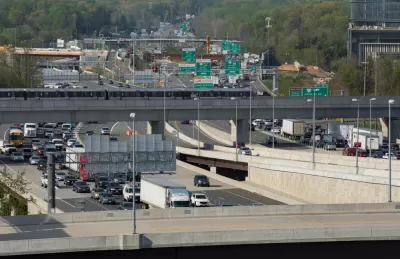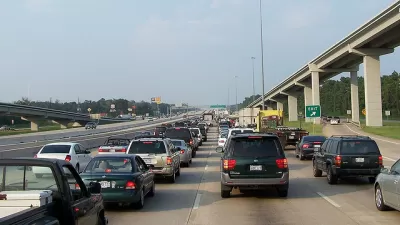A study by David C. Phillips, associate professor of economics at the University of Notre Dame, reveals hiring prejudice against people who would have to commute farther to work, in addition to bias against people with "black sounding" names.

"Low-wage employers in Washington, D.C., discriminate against applicants with longer commutes and those with stereotypically “black” names," reports Denise-Marie Ordway, previewing a study [pdf] forthcoming in the Journal of Human Resources.
"The study finds that when presented with otherwise similar resumes, hiring managers who are trying to fill a position that requires only a high school diploma are less likely to call back applicants who live farther away. Applicants from distant communities get 14 percent fewer callbacks than those living nearby," according to Ordway.
The finding about a preference for hiring people with shorter commutes is separate from the study's other finding: that people with stereotypically black sounding names are also less likely to receive hiring call backs.
The author of the story, David C. Phillips, views these findings as likely to mirror similar realities in other cities. "[Phillips] suggests that policies aimed at moving lower-income adults closer to jobs or better public transportation systems may improve their chances of securing work," according to Ordwell. The article also clearly stands the new study in contrast to a 2007 study by scholars at the National Bureau of Economic Research and Harvard University finding that "public housing residents did not improve their work status after moving to higher-income areas."
Phillips also presents these findings as troubling in light of an increasing super commuters and low-income populations moving farther afield in metropolitan areas, drastically increasing commute trip lengths in the demographic.
The new study also isn't the first to find evidence of bias against super commuters. A Planetizen blog post by Shane Philips from February 2014 details the findings and implications of similar analysis conducted at Xerox Services.
FULL STORY: Some employers discriminate against applicants with longer commutes

Alabama: Trump Terminates Settlements for Black Communities Harmed By Raw Sewage
Trump deemed the landmark civil rights agreement “illegal DEI and environmental justice policy.”

Study: Maui’s Plan to Convert Vacation Rentals to Long-Term Housing Could Cause Nearly $1 Billion Economic Loss
The plan would reduce visitor accommodation by 25% resulting in 1,900 jobs lost.

Planetizen Federal Action Tracker
A weekly monitor of how Trump’s orders and actions are impacting planners and planning in America.

Wind Energy on the Rise Despite Federal Policy Reversal
The Trump administration is revoking federal support for renewable energy, but demand for new projects continues unabated.

Passengers Flock to Caltrain After Electrification
The new electric trains are running faster and more reliably, leading to strong ridership growth on the Bay Area rail system.

Texas Churches Rally Behind ‘Yes in God’s Back Yard’ Legislation
Religious leaders want the state to reduce zoning regulations to streamline leasing church-owned land to housing developers.
Urban Design for Planners 1: Software Tools
This six-course series explores essential urban design concepts using open source software and equips planners with the tools they need to participate fully in the urban design process.
Planning for Universal Design
Learn the tools for implementing Universal Design in planning regulations.
Caltrans
Smith Gee Studio
Institute for Housing and Urban Development Studies (IHS)
City of Grandview
Harvard GSD Executive Education
Toledo-Lucas County Plan Commissions
Salt Lake City
NYU Wagner Graduate School of Public Service





























